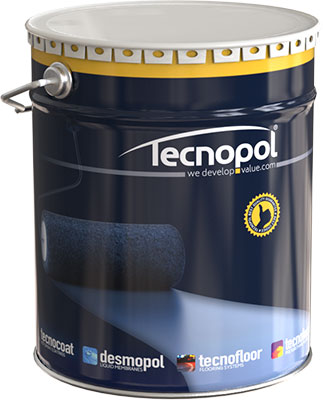GENERAL SPECIFICATIONS
- Single-component liquid, polyurethane solvent-based, moisture-cured to form a solid, aliphatic and transparent, completely adhered to the substrate, seamless, without joints or overlaps, watertight and waterproof membrane to be used on new buildings or refurbishments for pedestrian use.
- Admitted substrates : ceramic tiles, natural stones, wood. For other types of substrates, contact our technical department.
- it should be applied in dry conditions avoiding the presence of humidity or coming from the surface to be coated or the substrate, whether at the time of application or subsequently (pressure from phreatic water level)
- Apply Primer T previously, to avoid bubbles, spots and to improve the adhesion
- Not use in pools, or chemically treated water, in general not use on total water immersion.
- Once formed, do not clean the support with bleach or highly corrosive products.
YIELD
The recommended minimum thickness is 1.00 mm (DFT), so the yield is 1.42 kg/sqm (DFT) applied in several coats. These data may vary depending on support or climatic conditions.
PACKAGING
Metal tins in two different formats: 20 kg / 5 kg.
SHELF LIFE
12 months at temperatures between 5 and 35° C (41 to 95 ºF), provided it is stored in a dry place. Once the tin has been opened, the product must be used.
APPLICATION METHOD
The following factors prior to application should be checked:
- previous preparations of the substrate through physical processes (substrate preparation (sanding, polishing, shot blasting, or milling) for laitance and reliease agents as well as for the opening of the surface pore, achieving a suitable anchorage profile. (CSP 3 -4-5, according to the ICRI)
- existing holes or areas with a lack of material must be repaired using some or our epoxy resins: Primer EP-1020/Primer EP-1010
- joint fillings with Mastic PU
- in existing dilatations joints: remove old material, clean, and fill with Mastic PU. Use also Tecnoband 100 to cover, if necessary.
- joint filling for installation, work and consolidation of surfaces.
- general cleaning of the substrate, removing existing dust, dirt, grease or efflorescence. The substrates must be resistant and cohesive.
Concrete or mortar substrate
- concrete should be completely cured (concrete curing takes 28 days) or, in any case, the maximum level of humidity allowed for the substrate should be verified, depending on the primer used.
- concrete must have a surface with a correct planimetry, high surface resistance, eliminating laitance or release agents, without excessive irregularities. Therefore, the previous action of sanding, polishing, milling or shot-blasting will be assessed by the applicator to achieve a preparation of the support according to ICRI Guide 03732, CSP values 3 to 5.
- cracks and damaged areas must be repaired using epoxy mortar Primer EP-1020/Primer EP-1010.
- Mastic PU must be used on fissures or small cracks on the surface.
- existing joints or seals: remove the old material, clean up and fill with Mastic PU
- clean up well and eliminate all contaminants from the elements, such as dust or chippings, using dry methods preferably.
- Primer T application using a clean cloth, total consumption approximately 70-100 g/sqm
- apply the membrane
Ceramic tiles substrate
- ceramic surfaces should not have empty joints or loose elements or parts. These should be filled with Mastic PU mastic or mortar, according to their size.
- existing joints or seals: remove the old material, clean up and fill with Mastic PU and reinforced using Tecnomesh 100
- sanding with specific equipment. Thereby, to remove moss or solids particles bonded to the support, and opening the pore.
- clean up, using a vacuum method.
- Primer T application using a clean cloth, total consumption approximately 70-100 g/sqm
- apply the membrane
NOTE: For other types of substrates, weather conditions or the substrate to be applied, consult our technical department.
HEALTH AND SAFETY
These safety recommendations for handling, are necessary for the implementation process as well as in the pre and post, on exposure to the loading machinery.
- Respiratory Protection: When handling or spraying use an air-purifying respirator.
- Skin protection: Use rubber gloves, remove immediately after contamination. Wear clean body-covering. Wash thoroughly with soap and water after work and before eating, drinking, or smoking.
- Eye / Face: Wear safety goggles to prevent splashing and exposure to particles in the air.
- Waste: Waste generation should be avoided or minimized.
- Incinerate under controlled conditions in accordance with local laws and national regulations.
- Re-occupancy of the work site without respiratory equipment is minimum 24 hours providing the correct ventilation for the area sprayed.
- Contractors and applicators must comply with all applicable and appropriate guidelines for storage and safety guidelines.
Consult the material and safety data sheet of the products of the system.
TECHNICAL AND CHEMICAL PROPERTIES
|
PROPERTIES
|
Values
|
| Density ISO 1675 |
1.00 ±0.05 g/cm³ |
| Viscosity ISO 2555 |
1,350 ~ 350 cps |
| VOC content (volatile organic compounds) |
375~425 g/l |
| Solid content ISO 1768 |
75±5 % |
| Elongation at break ISO 527-3 |
>200% |
| Tensile strength ISO 527-3 |
<20 MPa |
| Tear Strength ISO 34-1 |
85 N/mm |
| Hardness Shore A DIN 53505 |
>85 |
| Adherence to concrete |
>1.70 MPa |
| Initial dry time |
5~6 hours |
| Recoat range time |
6~24 hour |
|
Use temperature range (environment)
|
-20~80 ºC (-4 to 176ºF )
|
|
Application temperature range (substrate and environment)
|
5 ~ 35 ºC (41 to 95ºF )
|
| Maximum envinronmental moisture |
80% |
|
Thermal stability (100 days at 80 ºC)
|
OK
|
|
QUV Resistance to weather test(4hr UV, at 60 ºC (UVB light) & 4hr at 50 ºC)
|
OK( 3.000h)
|
Results were performed in the laboratory at 23ºC (73ºF)and 50% RH, under controllable conditions. These values may vary depending on the application, climatology, or substrate conditions.











